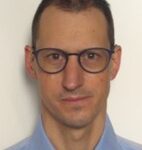
Marco Tettamanti, Ph.D., Professore Associato in Psicobiologia e Psicologia Fisiologica. Nel 1996, ha conseguito la laurea magistrale in neurobiologia e biologia molecolare presso il Biozentrum dell’ Università di Basilea, Svizzera. Nel 2004, ha ottenuto un dottorato in Neuroscienze presso l’Università di Zurigo, Svizzera. Dal 2004 al 2018 ha lavorato come ricercatore IRCCS presso l’ Istituto Scientifico San Raffaele di Milano, Italia. Dal 2018 al 2022 ha ricoperto il ruolo di Professore Associato presso il Centro Interdipartimentale Mente/Cervello (CIMeC) dell’ Università di Trento, Italia. Dal 2022 afferisce all’ Università di Milano-Bicocca.
La sua ricerca si concentra principalmente sulla neurobiologia del linguaggio, combinando metodi psicolinguistici, psicofisici, neuropsicologici e cognitivo-computazionali con tecniche di neuroimaging multimodale (MRI, MEG, EEG, TMS) per comprendere i meccanismi neurali alla base delle funzioni del linguaggio normale e patologico e dello sviluppo del linguaggio.